Over the last year alone, I’ve had the great privilege of many hours underwater with sharks of various shapes and sizes.
Many have been smaller species, such as the catsharks, tope and smoothhound you commonly see on British dives. However, I’ve also dived outside the cage with great whites, gone nose-to-nose with tigers and bulls, and followed pilot whales in order to freedive with the oceanic whitetips that trail them. I’ve shared the seas with makos – the fastest shark on Earth, as well as lemon sharks, silkies and various reef sharks.
Every encounter has been a true wonder, and I have learned to not only respect, but deeply love these majestic, exciting creatures. I’ve also found out through experience quite how harmless to humans these ancient animals really are.
Despite the drama of the great whites, my favourite shark encounter by far was with blue sharks – a species common to British waters. They are a glorious, slender, languidly moving beast, with an almost electric sheen to their exquisite skin, somewhere between sapphire and blue steel. I was free-diving alongside them in the open ocean, far from shore. The sharks stayed with us for seven hours, never more than a few feet from our masks, yet their interest never felt intimidating for a second.
One huge blue must have been three-and-half metres long, but nuzzled up against me like a big friendly puppy dog, far more interactive than any dolphin or seal has ever been. If I had been more sentimental, I would have taken his gentle nosing to be affection. He clearly enjoyed having the electrical sensors on his snout stimulated, and kept coming around and around, almost begging me to play. It was a touching, awe-inspiring, overwhelming encounter.
And yet, this may be an experience the next generation will not be able to share. Between 2000 and 2012, more than half a million tonnes of blue shark were reported to have been landed from the Atlantic by the EU fleet. This equates to approximately 13 million individual sharks, all caught with no limits.
The number of blue sharks being landed has tripled since 2002, and cannot be sustained. And blues are not the only species in this category. The oceanic whitetips that I worked so hard to see, have in some parts of their range declined by 98%, while closer to home porbeagle, spiny dogfish, common skate and angel sharks have been fished to critically endangered levels. I’ve stood on British harboursides, looking in horror at crates and crates of our native catsharks, waiting to be sold for pennies or even given away as pot bait.
The most frightening aspect of all of this is that the whole practice of catching many of these sublime creatures is almost totally unregulated – including for blue shark, shortfin, mako, tope, smoothhound and catsharks, the Shark Trust’s No Limits? campaign species.
In fact, 97% of sharks landed from the Atlantic are so-called No Limits? species – that is, fishermen can bring in as many of them as they want. Historically, some of them are considered so low value they are simply pitched back overboard as discards, but increasingly more of these smaller species are kept, taking the place of other species whose populations have declined.
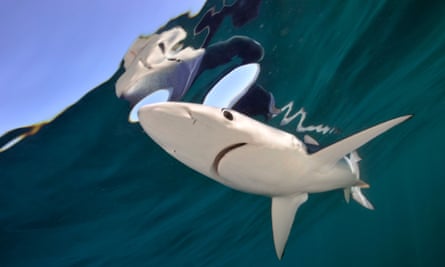
The numbers of these magnificent apex predators that are caught are without doubt underestimated – some sources think the actual catch could be three to four times higher.
One offshore longliner can deploy up to 200 longlines in a single set, holding some 3,000 hooks and stretching for 60 miles. In coastal waters, trawls and gillnets can also catch sharks in substantial volume. Out in deeper water, pelagic – or midwater – trawls target pelagic fish such as herring and mackerel using nets that can be 160m deep and 240m wide. Large pelagic trawlers are capable of catching several hundred tonnes of fish in one haul – which often includes sharks.
And this isn’t just a problem happening in distant oceans. The EU is a global fishing power: of the 280,000 tonnes of sharks reported landed globally in 2012 (roughly equivalent to the weight of 21,000 double decker buses), the EU fleet was responsible for almost 40%. The vast majority of these landings were caught in the Atlantic Ocean.
Landings simply can’t go on increasing at this rate without consequences: porbeagle and spiny dogfish populations provide a sobering example, as overfishing has so severely reduced these populations that they are now listed as critically endangered in the north-east Atlantic.
My reaction to this devastation is visceral and emotional. These animals have been around on the planet for more than 400 million years. They have more that is unusual and fascinating about their biology than any other animal group, and are the most unfairly maligned of all creatures.
However, the reaction must also be scientific. If the world’s oceans have had nearly half a billion years with sharks as the apex predators, then the delicate balance of its food webs must rely on their presence, in complex ways we cannot possibly predict.
Lose the sharks, the mighty, mysterious lords of the deep, and our planet’s oceans would be infinitely poorer places – and that’s why I’m supporting the Shark Trust’s No Limits? campaign, which appeals to the public to support the adoption of catch limits for blue sharks, shortfin mako, tope, smoothhounds and catsharks, by signing an online petition urging governments to act before these species follow other previously abundant Atlantic shark populations into collapse.
The UK government has championed sharks in the past and I really hope they will do so again.
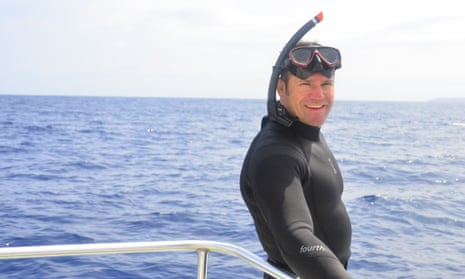
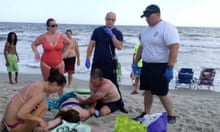

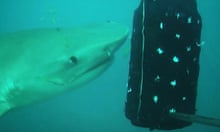
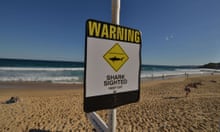
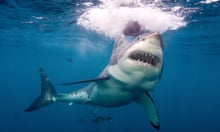

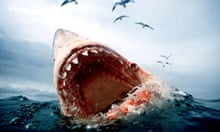
Comments (…)
Sign in or create your Guardian account to join the discussion